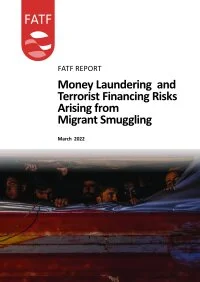Money Laundering and Terrorist Financing Risks Arising from Migrant Smuggling
By The Financial Action Task Force (FATF)
Migrant smuggling is a global issue. Every year, millions of migrants seek to escape regional conflict, political instability, persecution and poverty in search of a better future. They can risk their lives at the hands of migrant smugglers who see them as an opportunity to make financial gains and often have little regard for the migrants’ safety. The proceeds generated by migrant smuggling are estimated to exceed USD10 billion per year.
This FATF report analyses the money laundering and terrorist financing risks associated with migrant smuggling. While there has been an increase in migrant smuggling, many countries do not consider it a high-risk crime for money laundering and the associated financial flows are rarely investigated.
The report identifies the most common methods to transfer and launder the proceeds of migrant smuggling, from hawala, integration of proceeds into legitimate business such as shops, travel agencies and transport companies, and the increasing use of professional money launderers. Using countries’ experiences, the report provides several recommendations and good practices that allow authorities to better trace criminal proceeds and enhance the effectiveness of money laundering investigations.
The report highlights the need for countries to understand the money laundering risks they face from migrant smuggling and to proactively follow the money linked to this criminal activity, including through increased collaboration with national and international authorities and the private sector.
The FATF calls on countries to proactively follow the money linked to migrant smuggling. Strengthening institutional, international and regional cooperation is an important step. There should be particular focus on supporting countries directly affected by migrant smuggling.
Paris: FATF, 2022. 78p.


